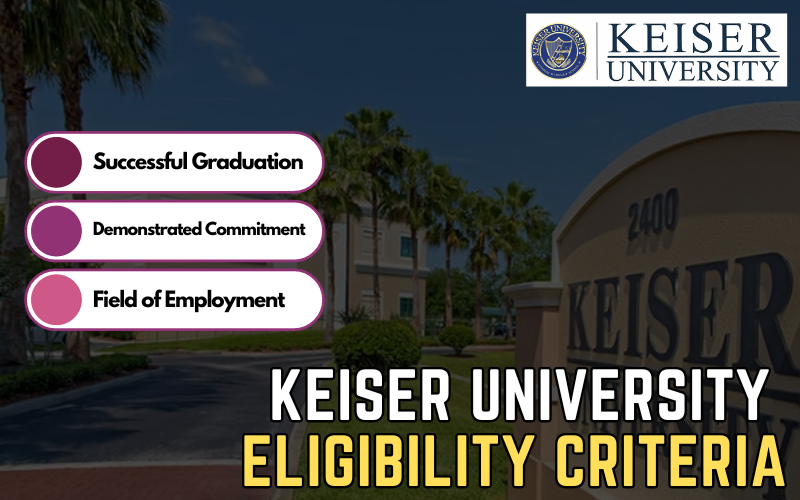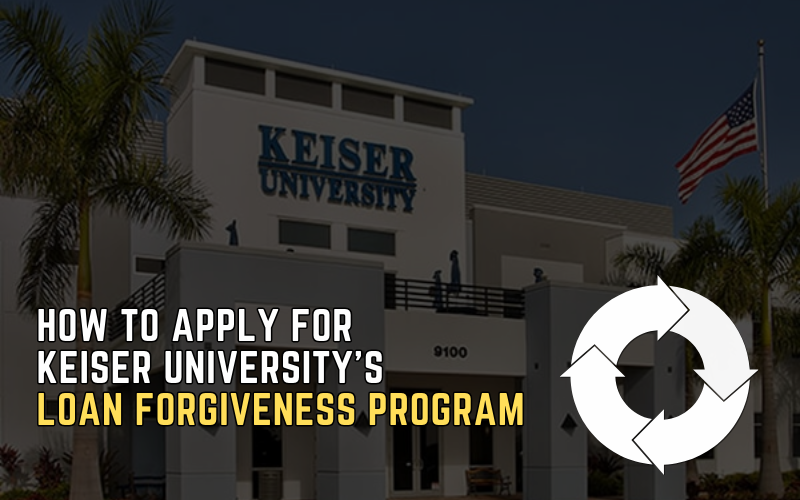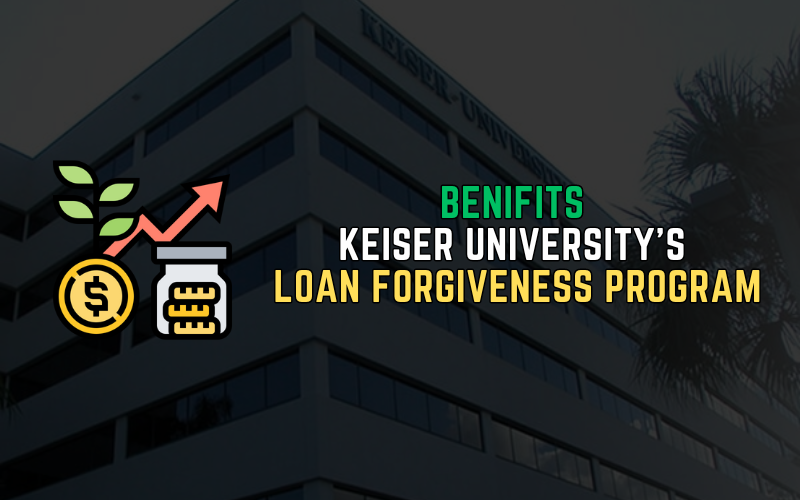
If you’ve ever wondered about a lifeline in the realm of student loans, look no further – the Keiser University Loan Forgiveness Program is here to transform your financial landscape.
In a world where the burden of student loans can cast a shadow over one’s academic achievements, Keiser University emerges as a beacon of relief, offering a comprehensive and well-crafted solution.
In this blog, we delve into the intricacies of the Keiser University Loan Forgiveness Program, dissecting each detail to guide you toward a future unencumbered by the weight of student debt.
Get ready to embark on a journey of financial empowerment with Keiser’s commitment to your success.
Keiser University Loan Forgiveness Program 2023
Before we dive into the nitty-gritty of the Keiser University Loan Forgiveness Program, we want to acknowledge the multitude of questions swirling in your minds.
Today, right here in this article, we’re on a mission to unravel the mysteries and provide you with the answers you seek. Some of these burning questions are outlined below, setting the stage for a comprehensive exploration of the Keiser University Loan Forgiveness Program.
Let’s embark on this journey together, addressing each query to ensure you have the insights you need.
What is Keiser University’s Loan Forgiveness Program?
Keiser University’s Loan Forgiveness Program is a financial lifeline designed to alleviate the burden of student loans for eligible graduates. This program reflects Keiser University’s commitment to the well-being of its alumni, extending support beyond the classroom. Through a tailored approach, it addresses diverse financial situations, offering personalized solutions for graduates in various fields such as healthcare, business, and technology.
One distinctive feature of the program is its emphasis on employment-based forgiveness. Graduates entering high-demand fields can qualify for loan forgiveness based on their employment in critical sectors. This not only encourages career pursuits in essential areas but also aligns with Keiser’s goal of producing industry-ready professionals.
Navigating the application process is made user-friendly, with clear guidelines and transparent communication. Keiser empowers graduates to secure a debt-free future, emphasizing not only financial relief but also personal and professional growth. The Loan Forgiveness Program stands as a testament to Keiser University’s dedication to fostering success beyond graduation, ensuring that alumni thrive in their post-academic endeavors.
How does Keiser University’s Loan Forgiveness Program work?
Keiser University’s Loan Forgiveness Program operates as a strategic initiative to ease the financial burden of student loans for eligible graduates. The program’s functionality is rooted in a commitment to personalized solutions and supporting graduates in various fields.
One key aspect of the program is its adaptability to diverse financial situations. Recognizing that each graduate’s circumstance is unique, Keiser’s Loan Forgiveness Program tailors its approach, providing specific relief measures for individuals who have demonstrated commitment and dedication during their academic journey.
Employment-based forgiveness is a standout feature. Graduates entering certain high-demand fields can qualify for loan forgiveness based on their employment in critical sectors. This approach not only incentivizes students to pursue careers in vital areas but also aligns with Keiser’s mission of producing professionals ready to excel in their industries.
Navigating the application process is designed to be straightforward. Keiser University ensures clarity by offering transparent guidelines, simplifying the steps needed to take advantage of this invaluable program. The institution’s focus extends beyond mere financial relief; it aims to empower graduates, allowing them to embark on their professional journey without the weight of substantial student debt.
In essence, Keiser University’s Loan Forgiveness Program is a multifaceted initiative. It combines adaptability to individual situations, encouragement for career paths in high-demand fields, and a user-friendly application process to provide graduates with a clear pathway to a debt-free future. Through this program, Keiser underscores its commitment to supporting students not only during their academic pursuits but also as they transition into successful professionals.
Eligibility Criteria for Keiser University’s Loan Forgiveness Program

Keiser University’s Loan Forgiveness Program has straightforward yet crucial eligibility criteria designed to ensure fair access to financial relief for qualified graduates. To be eligible for this program, individuals must meet the following criteria:
- Successful Graduation: Applicants must have successfully completed their degree programs at Keiser University. The program is typically available to graduates who have fulfilled all the academic requirements for their respective degrees.
- Demonstrated Commitment: The program acknowledges and rewards graduates who have demonstrated commitment and dedication during their academic journey at Keiser University. This commitment could be reflected in various forms, such as academic excellence, active participation in campus activities, or community engagement.
- Field of Employment: Keiser University’s Loan Forgiveness Program places emphasis on employment-based forgiveness. Eligibility may be tied to graduates entering specific high-demand fields relevant to societal needs. This aligns with Keiser’s goal of producing professionals who contribute meaningfully to critical sectors.
- Compliance with Program Guidelines: Applicants must adhere to the program’s guidelines and requirements. This includes timely submission of necessary documentation, compliance with deadlines, and any other criteria outlined by the program.
It’s important to note that these eligibility criteria are designed to be inclusive while ensuring that the benefits of the Loan Forgiveness Program are directed toward graduates who have actively contributed to their academic community and are pursuing careers in fields that align with societal needs. Keiser University is dedicated to providing a clear and fair pathway to financial relief for eligible graduates through this program.
How to Apply for Keiser University’s Loan Forgiveness Program

If you’re considering applying for Keiser University’s Loan Forgiveness Program, here’s a detailed guide to help you navigate the process:
Before initiating your application, ensure that you meet the following conditions:
| Conditions | Requirements |
|---|---|
| Graduation from Keiser University | Successful completion of all academic requirements for the respective degree at Keiser University. |
| US Citizenship or Permanent Residency | Eligibility limited to U.S. citizens or permanent residents. Documentation required to establish status. |
| Federal Loans for Keiser Education | Must have taken out federal loans to finance education at Keiser University. Gather loan details. |
| Identification Proofs and Bank Details | Valid government-issued ID, proof of residency, and bank account information for fund disbursement. |
| Income Verification | Income at or below 150% of federal poverty guidelines. Provide documentation like tax returns or pay stubs. |
Application Process:
| Application Process Steps | Details |
|---|---|
| Contact Program Administrators | Reach out to designated administrators for guidance, information, and answers to questions. |
| Application Form and Documentation | Obtain the official form, accurately complete it, and attach required documents (e.g., graduation proof, federal loan details, identification proofs, bank information, and income verification). |
| Submission | Submit the completed application with supporting documents by the specified deadline. |
| Follow-Up and Communication | Proactively follow up with administrators to check the application status and address any additional requests promptly. |
| Adherence to Guidelines | Comply with all guidelines set by Keiser University’s Loan Forgiveness Program, including reporting obligations and updates as requested by administrators. |
By meticulously following these steps, you can enhance your application experience and increase the likelihood of a successful outcome in Keiser University’s Loan Forgiveness Program.
Benefits of Keiser University’s Loan Forgiveness Program

Keiser University’s Loan Forgiveness Program offers a range of significant benefits to eligible graduates, aiming to alleviate the financial burden associated with student loans. Here are the key advantages of participating in Keiser’s Loan Forgiveness Program:
Financial Relief:
- Graduates who qualify for the program can receive forgiveness on a portion or the entirety of their federal loans, offering a tangible solution to the challenge of student debt.
Tailored Solutions:
- The program recognizes and addresses the diversity of financial situations among graduates.
- By offering tailored solutions, Keiser ensures that the benefits cater to individual needs, making the program accessible and relevant to a wide range of alumni.
Employment-Based Forgiveness:
- Keiser University’s focus on employment-based forgiveness is a standout feature.
- Graduates entering high-demand fields can qualify for loan forgiveness based on their employment in critical sectors.
- This not only promotes career paths in essential areas but also aligns with the university’s commitment to producing professionals with real-world impact.
Societal Contribution:
- By incentivizing graduates to pursue careers in high-demand fields, the program encourages individuals to contribute meaningfully to society.
- This aligns with Keiser University’s mission of producing graduates who are not only academically proficient but also actively engaged in addressing societal needs.
Empowerment Beyond Finances:
- The program goes beyond financial relief; it empowers graduates to embark on their professional journeys unencumbered by substantial student debt.
- This empowerment extends to personal and professional growth, fostering a sense of confidence and readiness as graduates step into the post-academic phase of their lives.
Clear Application Process:
- The application process for Keiser’s Loan Forgiveness Program is designed to be user-friendly.
- With clear guidelines and transparent communication, the university facilitates a smooth and accessible application experience for eligible graduates.
Community Support:
- Keiser University actively engages with its alumni community, creating a network of support.
- Participating in the Loan Forgiveness Program connects graduates with a community that understands and values their academic achievements, providing ongoing support beyond the classroom.
Holistic Approach to Success:
- The program is part of Keiser University’s holistic approach to education.
- By addressing financial concerns, Keiser ensures that graduates are equipped not only with academic knowledge but also with the resources to navigate the challenges of post-graduation life successfully.
Participating in Keiser University’s Loan Forgiveness Program is not just about erasing student debt; it’s about opening doors to a brighter and financially unburdened future, where graduates can thrive both professionally and personally.
Potential Drawbacks of Keiser’s Loan Forgiveness Program
While Keiser University’s Loan Forgiveness Program presents various benefits, it’s essential to consider potential drawbacks to make an informed decision. Understanding both sides ensures graduates have a comprehensive perspective on the program
Limited Eligibility Criteria:
The program’s eligibility criteria, such as income restrictions and field-specific requirements, may limit the number of graduates who can benefit. Those outside the specified parameters might not qualify, potentially excluding a portion of the student body.
Documentation Requirements:
The need for extensive documentation, including proof of graduation, federal loan details, identification, and income verification, can be cumbersome. Graduates may find the application process challenging, especially if they face difficulties in gathering and submitting the required paperwork.
Dependency on Federal Loans:
Graduates who financed their education through sources other than federal loans may find themselves ineligible for the program. This limitation could be a drawback for those who opted for alternative funding methods.
Application Process Complexity:
Despite efforts to make the application process user-friendly, some graduates may still find it complex or confusing. The intricacies of navigating the application, coupled with the need for meticulous documentation, could be perceived as a drawback for individuals seeking a straightforward process.
Limited Career Flexibility:
The emphasis on employment-based forgiveness may restrict graduates’ career flexibility. Those who wish to explore different fields or career paths might find themselves in a dilemma, as the program incentivizes staying within specific high-demand sectors.
Ongoing Commitments:
Graduates accepted into the program might have ongoing commitments, such as reporting requirements or updates, which could extend over an extended period. This could be perceived as a drawback for those who prefer a more hands-off approach after the initial application.
Uncertain Future Changes:
The terms and conditions of loan forgiveness programs can be subject to change. Graduates entering the program should be aware that future alterations in federal policies or university guidelines may impact the program’s benefits.
Potential Impact on Credit Score:
While loan forgiveness itself doesn’t typically negatively impact credit scores, certain aspects of the application or enrollment process could. Graduates should be cautious and seek financial advice to understand any potential implications for their credit standing.
Understanding these drawbacks alongside the benefits allows graduates to make an informed decision about whether Keiser University’s Loan Forgiveness Program aligns with their individual circumstances and goals. It’s advisable for potential participants to carefully review the program’s details and consult with financial advisors before committing.
Exploring Student Debt Forgiveness Averages at Keiser University
The forgiveness of student loan debt within Keiser University’s Loan Forgiveness Program is contingent upon individual eligibility factors. As per the university’s official information, the average amount forgiven hovers around $19,000.
This figure underscores the program’s commitment to providing substantial financial relief to eligible graduates, addressing the challenges associated with student loan repayment.
The application process for Keiser University’s Loan Forgiveness Program
To initiate the application process for Keiser University’s Loan Forgiveness Program, you need to complete an application form available from the university’s financial aid office. This application entails providing documentation related to your income and federal student loans.
Once you’ve filled out the application, submit it to the financial aid office for processing. Subsequently, the financial aid team will carefully review your application, assess your eligibility, and communicate the approval status to you.
Navigating the Approval Process for Keiser University’s Loan Forgiveness Program
The timeframe for approval within Keiser University’s Loan Forgiveness Program is variable and hinges on several factors. Typically, the review process for loan forgiveness applications spans several weeks or potentially months, contingent upon the volume of applications in the university’s queue.
As of Novemebr 04, 2023, upon submission of your loan forgiveness application, Keiser University’s financial aid office diligently reviews it alongside the requisite documentation. Eligibility assessment encompasses factors like loan types and amounts, the impact of any encountered fraudulent practices, and an evaluation of your current financial situation.
Due to the personalized nature of the review and the influx of applications, providing an exact approval timeframe proves challenging. Patience is encouraged to allow the university the necessary time to comprehensively assess your application.
It’s essential to highlight that Keiser University offers the loan forgiveness application at no cost, and you can directly submit it to the university. Caution is advised against engaging with third-party entities that may charge fees for assisting with loan forgiveness applications, as Keiser University manages this process directly.
Upon approval of your loan forgiveness application, the subsequent phase initiates the loan forgiveness process. Keiser University will undertake the requisite procedures to forgive your loans. It’s crucial to thoughtfully consider the loan forgiveness offer, weighing your circumstances, before deciding to accept or decline.
Conclusion
The Keiser University Loan Forgiveness Program stands as a valuable opportunity for students grappling with the challenges of student loan repayment. Offering financial relief, the program presents a chance to improve credit scores and sidestep the pitfalls of default.
Yet, the road to loan forgiveness requires careful consideration of eligibility criteria and acknowledgment of potential drawbacks. Prior to applying, it is crucial to weigh the benefits against the limitations.
Seeking guidance from financial aid advisors can be instrumental in making an informed decision about the suitability of the Keiser University Loan Forgiveness Program for individual circumstances. By doing so, students can stride confidently towards a financial future unburdened by the weight of student loans.
FAQ
Is Keiser University’s Loan Forgiveness Program taxable?
Yes, loan forgiveness amounts are generally considered taxable income by the IRS. However, specific tax implications can vary based on individual circumstances.
Can I still qualify for Keiser University’s Loan Forgiveness Program if I have private student loans?
No, Keiser University’s Loan Forgiveness Program exclusively forgives federal student loans; private student loans are ineligible. This program specifically caters to individuals who have taken out federal student loans through the Wherein University Student Loan Forgiveness Program.
What are the income requirements for Keiser University’s Loan Forgiveness Program?
To qualify for Keiser University’s Loan Forgiveness Program, your income needs to fall within or below 150% of the federal poverty guidelines based on your family size.
For instance, for a family comprising two members, the income threshold for eligibility in Keiser University’s Loan Forgiveness Program is $18,000 per month. Likewise, for a family consisting of three members, the monthly income requirement is $23,000. Therefore, eligibility is determined by your family size, and the income criteria are adjusted accordingly.
Can I apply for Keiser University’s Loan Forgiveness Program if I am still in school?
To qualify for Keiser University’s Loan Forgiveness Program, graduation from Keiser University is a prerequisite.
Can Keiser University’s Loan Forgiveness Program be used for parent PLUS loans?
Keiser University’s Loan Forgiveness Program exclusively applies to federal student loans taken out by the student and cannot be utilized for parent PLUS loans.
What occurs in the event of a denial of my loan forgiveness application?
If your loan forgiveness application faces denial, students have the option to appeal the decision. This involves submitting supplementary documentation or presenting evidence related to any fraudulent practices encountered at Keiser University.
Can applying for loan forgiveness influence my credit score?
Initiating a loan forgiveness application is not expected to have a direct impact on a student’s credit score. However, it’s important to note that if the loans are eventually forgiven, the forgiven amount may be reported to credit bureaus by the lender, potentially affecting the student’s credit score.
